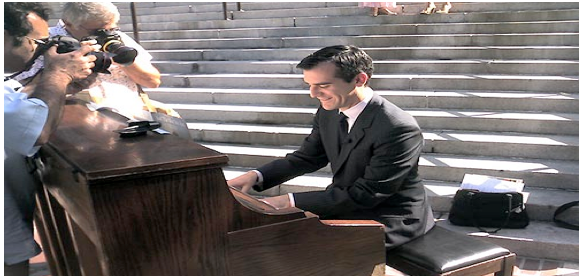GUESTWORDS - In electing Eric Garcetti their mayor, voters here chose a candidate who personifies the multiracial, multicultural city of L.A.’s hipster youth. At 42, Garcetti will be the youngest mayor this city has had in more than 100 years. Ethnically, Garcetti is not only the first elected Jewish mayor of Los Angeles but also the city’s second Latino mayor in more than 100 years.
His Italian forebears settled in Mexico; his mother’s family is Jewish. Not since New York was governed by Fiorello La Guardia — an Italian Episcopalian who had a Jewish mother — has a mayor been a better demographic fit for so polyglot a city.
Garcetti fits today’s LA in part because, unlike La Guardia, he wears his ethnic identities so lightly: He’s the perfect elected leader for the “race doesn’t matter” young Obama backers who like their pols as slim, smart (Garcetti was a Rhodes Scholar), cool and post-ethnic as Barack Obama himself.
Actually, in several particulars, cooler: Garcetti plays a mean jazz piano in a Keith Jarrett-esque mode; he resides in hipper-than-thou Silver Lake; and his main achievement in his 12 years representing Hollywood on the city council has been to help revitalize his long-bedraggled, if world-famous, district, making it safe again for middle-class revelers while requiring developers to build affordable housing and employers to pay living wages.
A liberal Democrat in a liberal Democratic town, Garcetti is likely to be among the greenest of mayors. Los Angeles, he says, has entered “the golden age of mass-transit construction.”
In 2008, gridlocked Angelenos voted to raise their sales tax for the next 30 years to fund a far-reaching web of rail-transit lines, a project that Villaraigosa — grasping its potential to reduce traffic and pollution and to create jobs — accelerated and that Garcetti vows to accelerate even more.
“This isn’t central planners pushing mass transit onto a city of drivers,” he says. “There’s huge demand out there for more buses, trains and bike lanes.”
The biggest demand in Los Angeles, however, is for good jobs. This city has never really recovered economically from the decimation of its aerospace industry — once the largest private-sector employer in the region — at the end of the Cold War.
As middle-income employment waned, the low-wage service-sector boomed, stranding hundreds of thousands of immigrants and other workers in jobs on construction sites, in restaurant kitchens or in overheated warehouses that offered meager pay and no security.
Garcetti insists that Los Angeles can again incubate the kind of vibrant, high-wage industries that once made it the marvel of post-World War II America. “There’s too much fatalism about the end of manufacturing and aerospace in LA,” he says. “Los Angeles is the third-biggest locale for high-tech start-ups, after Silicon Valley and Tel Aviv.”
The challenge is turning out enough qualified workers for those firms to decide to stay in LA once they expand — to which end he has a range of proposals for boosting both the quality and quantity of science, math and vocational educational programs. (Read the rest … including the economic shortcomings that Garcetti needs to fix … here)
-cw
CityWatch
Vol 11 Issue 43
Pub: May 28, 2013




